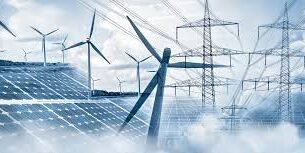In Short : The nearly finished Revolution Wind Project, which is situated off the coasts of Rhode Island and Connecticut, has been abruptly put on hold by the Trump administration. The project has been put on hold due to “national security concerns,” even though it is more than 80% finished and 45 of its 65 turbines have already been installed. Governors, legislators, clean energy advocates, and labor unions have all widely criticized the decision, claiming it jeopardizes America’s clean energy transition, which includes projects for solar and offshore wind.
Market Trends and Forecasts
Under long-term contracts with Rhode Island and Connecticut, the Revolution Wind project was scheduled to supply 350,000 homes with clean electricity, securing reasonable rates for the ensuing two decades. In an effort to lessen dependency on non-renewable resources like coal and oil, the project served as a centerpiece of America’s renewable resources strategy. Energy analysts caution that the suspension may cause investor uncertainty in offshore wind as well as in related industries, such as the production of solar panels, the share price of the solar industry, and even projects like solar light systems and solar system installations that depend on stable renewable energy policies.
Impact on the Industry and Strategic Platform
Political Reaction: Union representatives and Democratic governors of Rhode Island and Connecticut criticized the suspension as being motivated more by politics than by facts. They emphasized the importance of clean energy projects for local economies and job creation, whether they are offshore wind farms or massive solar energy parks.
Economic Setback: After spending billions on the project, developer Ørsted is now exposed to serious financial risks. Foreign investment in U.S. renewable energy projects may be discouraged by the halt, which could postpone or even cancel commitments.
Supply Chain Issues: At a time when nations like China are rapidly developing wind and solar system technologies, the United States runs the risk of undermining its renewable energy supply chain by abandoning the project.
Impact on Sustainable Development and Clean Energy
This ruling, according to proponents of clean energy, is a serious blow to America’s sustainable development objectives. Offshore wind is essential to reducing carbon emissions and moving away from fossil fuels, as are solar panel projects and planning based on solar system drawings. Opponents contend that stopping projects at this point could impede the transition to a future driven by renewable resources and erode trust in the renewable energy market.
The Bottom Line
The suspension of the Revolution Wind offshore project by the Trump administration underscores how precarious the advancement of renewable energy in the United States is. This halt increases uncertainty in the solar industry, which is already vulnerable to changes in policy due to solar panel projects, solar industry share price, and solar system installations. Critics view this as a step backward—choosing non-renewable resources over a sustainable, clean energy future—despite the administration’s citation of national security.




